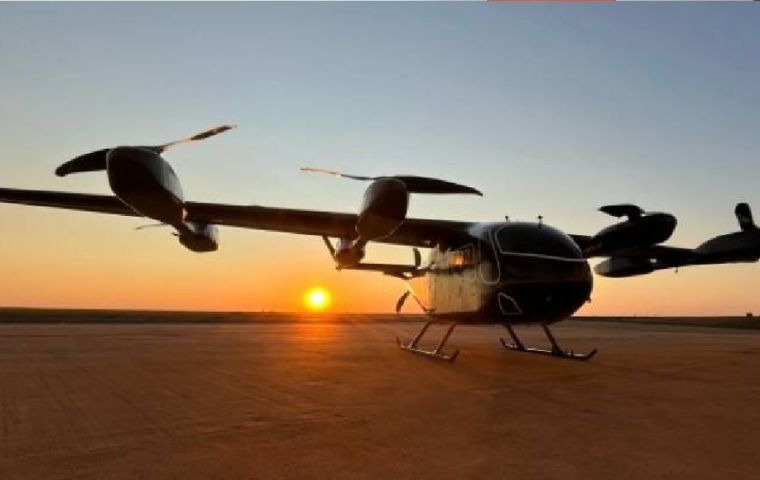MercoPress. South Atlantic News Agency
Brazilian flying taxi model launched
 The estimated range is 100 kilometers, due to which it will be limited to urban transport, at least in the early stages
The estimated range is 100 kilometers, due to which it will be limited to urban transport, at least in the early stages A subsidiary of Brazilian aircraft manufacturers Embraer launched this weekend in Gavião Peixoto, in the State of São Paulo, the full-scale prototype of the new flying taxi, which was introduced during the 45th edition of the Farnborough Airshow in England. According to Eve, the company behind this development, the eVTOL model represents a leap in urban aerial mobility which will transform cityscapes by 2026.
While “e” stands for “electrical”, VTOL means vertical takeoff and landing, a technology turning runways obsolete. According to company projections, Brazil’s National Civil Aviation Agency (ANAC) should certify this unmanned vehicle in 2026, after which it is expected to be the first choice for users willing to skip traffic jams. The idea is to take passengers from the city center to the airport in minutes and with no CO₂ emissions. Eve's national plant is to start operating in 2026 when deliveries of the flying car are expected to begin.
Eve's device uses take-off and cruise configuration “with dedicated rotors for vertical flight and fixed wings for the cruise stage without the need for in-flight transition components,” it was explained. It also includes a propeller powered by dual electric motors, which reduces operating costs and noise.
In the meantime, the model will be subject to countless safety and operation tests. Eve’s CEO Johann Bordais also announced flight tests will begin by early 2025. He also outlined the manufacturer's plans to have five more prototypes airborne by next year, gearing up for a pre-series model in the certification process.
In 2022, Eve secured US$ 400 million at the NYSE of the US$ 540 million needed for the eVTOL venture. The company also received a US$ 92 million loan from Brazil's Development Bank (BNDES) as well as an additional US$ 94 million from Embraer and Japanese suppliers Nidec, which have rendered Eve operational at least until 2027, it was reported.
Eve is said to have some 3,000 potential customers, including United Airlines and Global Crossing. “This is an important step that reinforces our commitment to safety, accessibility, and innovation,” Bordais stressed.
“As we turn our attention to preparing for a rigorous test campaign, we won't just be creating an aircraft, but building a comprehensive ecosystem of solutions that will shape the future of the Advanced Air Mobility industry,” he added.
Embraer is the third-largest aircraft manufacturer in the world and the market leader in regional commercial and executive models. It also produces defense and agriculture models. Since it was founded in 1969, it has delivered over 8,000 aircraft to operators worldwide.
Manufactured at the Taubaté plant in the State of Sao Paulo, the first EVE-100s are expected to be delivered in 2026. According to Eve Air Mobility, a journey in Miami (USA) that would take 45 minutes by car would take 15 minutes with the EVE-100. The estimated range is 100 kilometers, due to which it will be limited to urban transport, at least in the early stages.




Top Comments
Disclaimer & comment rulesCommenting for this story is now closed.
If you have a Facebook account, become a fan and comment on our Facebook Page!